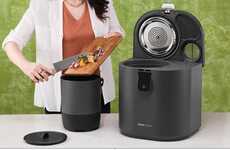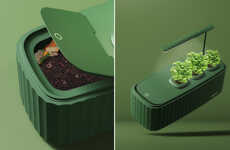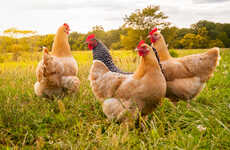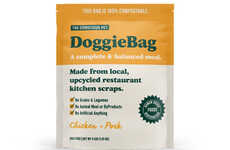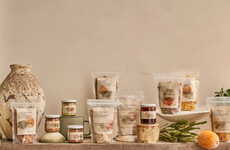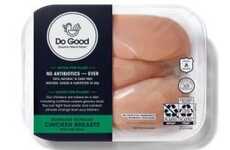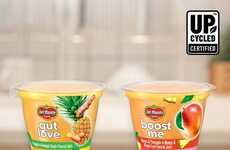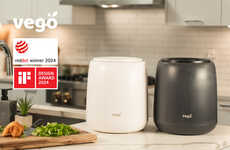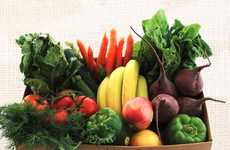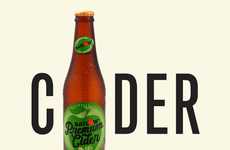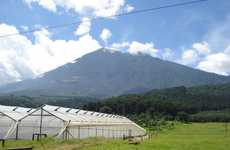
EcoScraps Turns Old Food into High Quality Soil Conditioner
Bianca — January 4, 2012 — Social Good
References: ecoscraps.net
Don't waste your food: we heard it as children, and most of us adopted the idea as adults that wasting food is bad -- yet studies show that in the US alone, 30 million tons of food are thrown out annually, contributing to the production of the dangerous greenhouse gas, methane. Beyond preventative solutions of simply eating everything, downsizing portions or buying less, EcoScraps aims to compost the waste into 100% organic soil conditioner. Specifically they target high-volume food waste sources like grocery stores and food banks and turn them into organic fertilizer .
"Through our proprietary process we are able to reduce landfill waste and methane emissions," the EcoScraps site says. "This soil conditioner has the same nutrient values as chemical based soil amendments while being organic. Our products are composed of ingredients selected and combined in scientifically determined proportions to produce ideal nutrient and organic content to the soil."
This not only gets rid of household waste, but allows those with green thumbs to grow their own plants and produce in an ethical, environmentally-friendly way. EcoScraps, based in Salt Lake City, was co-founded by Dan Blake, Craig Martineau and Brandon Sargent, who all dropped out of university to build the social business.
"Founded in 2010, the company collects roughly 20 tons of food waste a day from more than 70 grocers, produce wholesalers, and Costco stores across Utah and Arizona," Inc. Magazine explained in May. "Then, it composts the waste into potting soil, which retails for up to $8.50 a bag in nurseries and garden stores throughout the western United States."
To ensure the soil stays as clean as possible, EcoScraps only uses waste from fruits and vegetables, making it animal- (and feces-) free, and they promise their soil is "so organic you can eat it." They plan to expand the business to other states, including both compost collection and soil sales.
Contact Information
EcoScraps website
EcoScraps on Twitter
EcoScraps on Facebook
"Through our proprietary process we are able to reduce landfill waste and methane emissions," the EcoScraps site says. "This soil conditioner has the same nutrient values as chemical based soil amendments while being organic. Our products are composed of ingredients selected and combined in scientifically determined proportions to produce ideal nutrient and organic content to the soil."
This not only gets rid of household waste, but allows those with green thumbs to grow their own plants and produce in an ethical, environmentally-friendly way. EcoScraps, based in Salt Lake City, was co-founded by Dan Blake, Craig Martineau and Brandon Sargent, who all dropped out of university to build the social business.
"Founded in 2010, the company collects roughly 20 tons of food waste a day from more than 70 grocers, produce wholesalers, and Costco stores across Utah and Arizona," Inc. Magazine explained in May. "Then, it composts the waste into potting soil, which retails for up to $8.50 a bag in nurseries and garden stores throughout the western United States."
To ensure the soil stays as clean as possible, EcoScraps only uses waste from fruits and vegetables, making it animal- (and feces-) free, and they promise their soil is "so organic you can eat it." They plan to expand the business to other states, including both compost collection and soil sales.
Contact Information
EcoScraps website
EcoScraps on Twitter
EcoScraps on Facebook
Trend Themes
1. Food Waste Recycling - Turning food waste into high-quality soil conditioner to reduce landfill waste and methane emissions.
2. Organic Fertilizer - Creating organic fertilizer from food waste to provide an alternative to chemical-based soil amendments.
3. Sustainable Gardening - Promoting ethical and environmentally-friendly gardening practices by using composted food waste as soil.
Industry Implications
1. Waste Management - Applying innovative methods to reduce food waste and divert organic waste from landfills.
2. Agriculture - Providing sustainable and organic fertilizers for the gardening and farming industry.
3. Retail - Selling composted food waste as a high-quality soil conditioner in nurseries and garden stores.
4.2
Score
Popularity
Activity
Freshness

